The Millennial Influence: Tourism in the Last Decade
VerifiedAdded on 2023/05/27
|10
|3034
|324
Essay
AI Summary
This essay provides a comprehensive analysis of the impact millennials have had on the tourism industry over the last decade. It begins by introducing the millennial generation and their distinct travel behaviors, contrasting them with previous generations. The literature review explores existing research on millennial travel patterns, preferences for fast-paced and varied activities, and the use of technology. The essay examines arguments both for and against the changes brought by millennials, particularly in the context of social media and the sharing economy. It highlights the ways in which millennials have revolutionized tourism, including the adoption of internet-based travel planning and a focus on experiences. The essay also emphasizes the importance of sustainability in tourism, outlining strategies for attracting millennials while preserving the environment and local cultures. The conclusion summarizes the key findings, emphasizing the challenges and opportunities presented by the evolving preferences of millennial travelers and the need for the hospitality industry to adapt to these changes. The paper also discusses the implications of these trends for the future of the tourism sector.
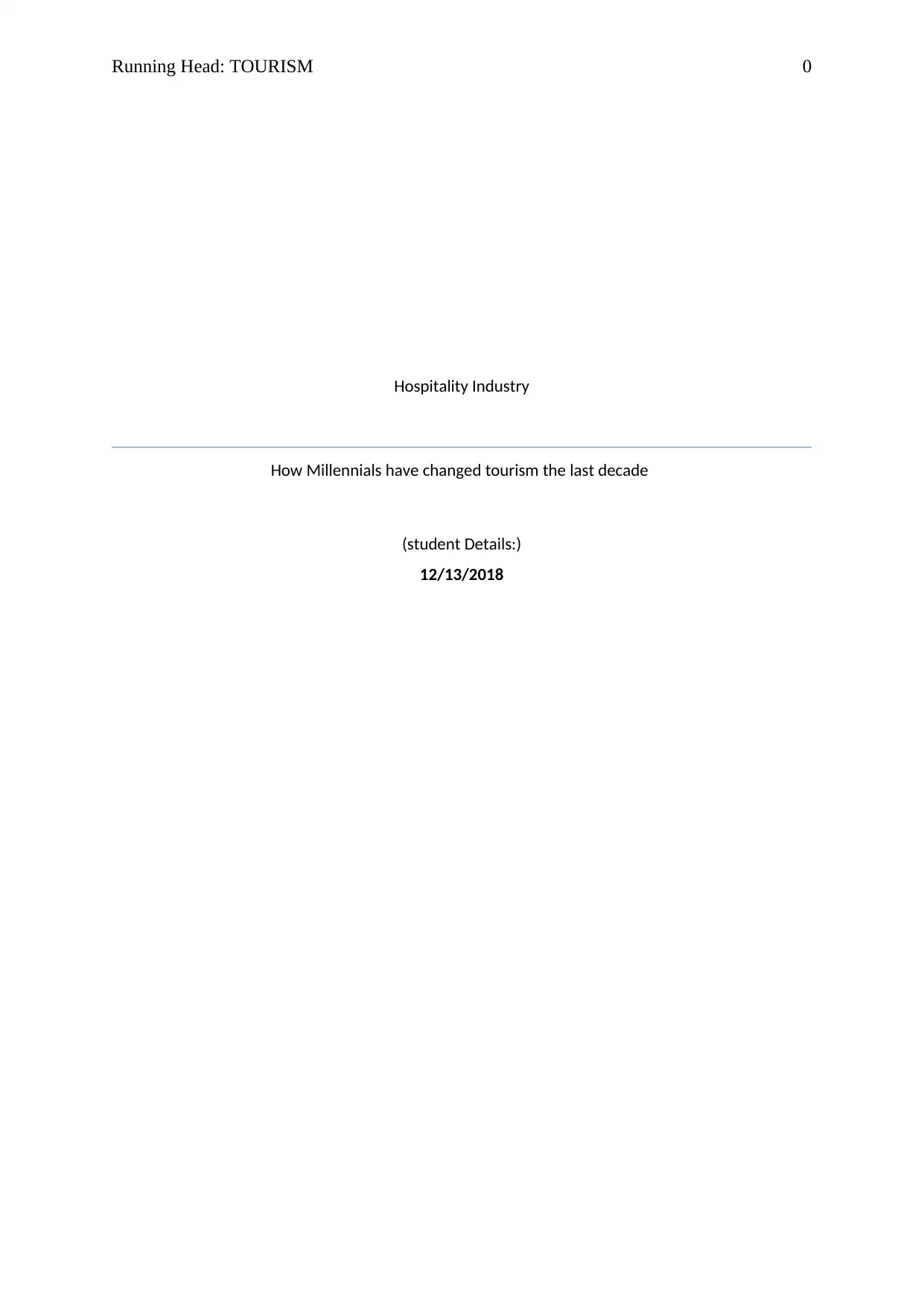
Running Head: TOURISM 0
Hospitality Industry
How Millennials have changed tourism the last decade
(student Details:)
12/13/2018
Hospitality Industry
How Millennials have changed tourism the last decade
(student Details:)
12/13/2018
Paraphrase This Document
Need a fresh take? Get an instant paraphrase of this document with our AI Paraphraser
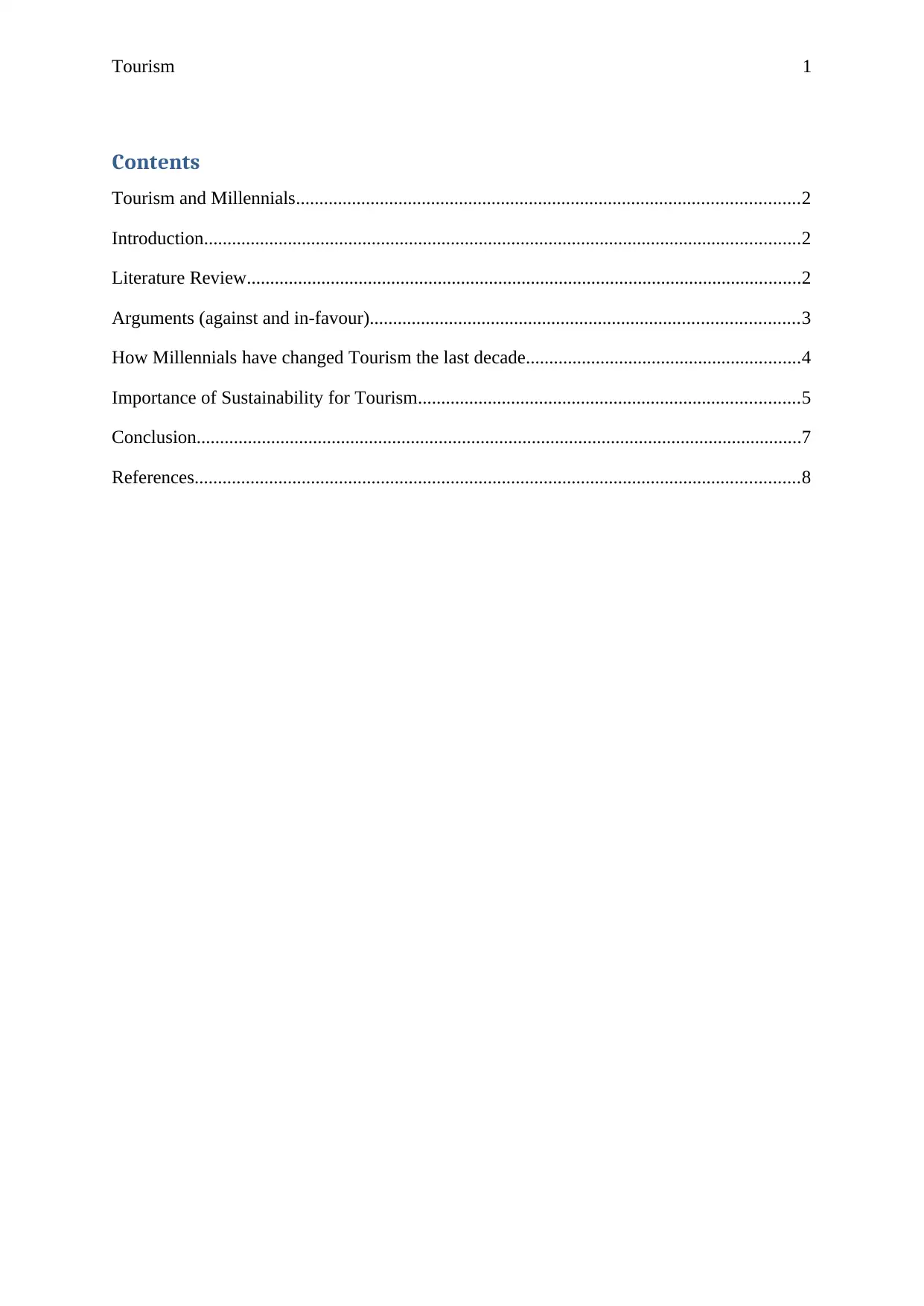
Tourism 1
Contents
Tourism and Millennials............................................................................................................2
Introduction................................................................................................................................2
Literature Review.......................................................................................................................2
Arguments (against and in-favour)............................................................................................3
How Millennials have changed Tourism the last decade...........................................................4
Importance of Sustainability for Tourism..................................................................................5
Conclusion..................................................................................................................................7
References..................................................................................................................................8
Contents
Tourism and Millennials............................................................................................................2
Introduction................................................................................................................................2
Literature Review.......................................................................................................................2
Arguments (against and in-favour)............................................................................................3
How Millennials have changed Tourism the last decade...........................................................4
Importance of Sustainability for Tourism..................................................................................5
Conclusion..................................................................................................................................7
References..................................................................................................................................8
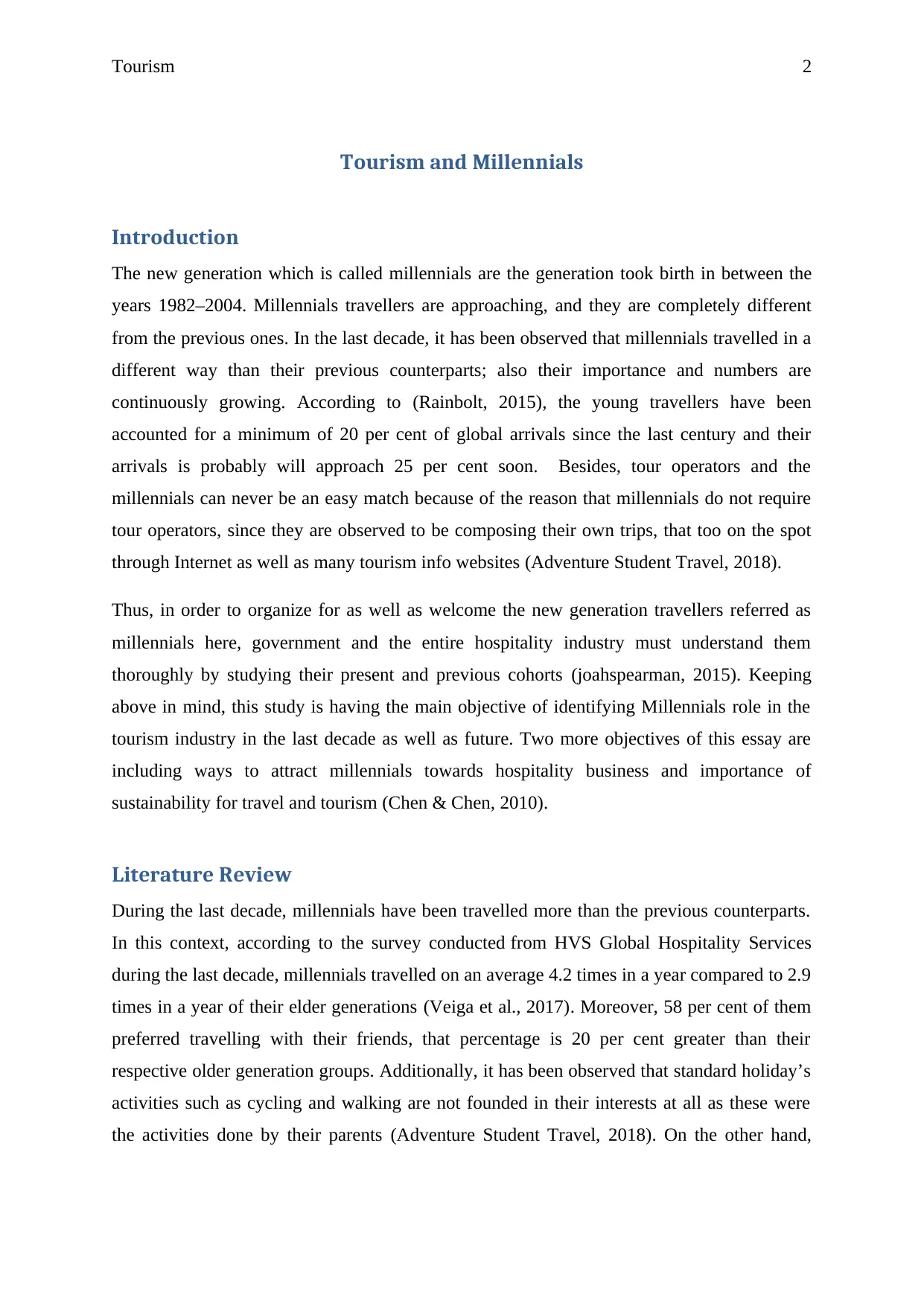
Tourism 2
Tourism and Millennials
Introduction
The new generation which is called millennials are the generation took birth in between the
years 1982–2004. Millennials travellers are approaching, and they are completely different
from the previous ones. In the last decade, it has been observed that millennials travelled in a
different way than their previous counterparts; also their importance and numbers are
continuously growing. According to (Rainbolt, 2015), the young travellers have been
accounted for a minimum of 20 per cent of global arrivals since the last century and their
arrivals is probably will approach 25 per cent soon. Besides, tour operators and the
millennials can never be an easy match because of the reason that millennials do not require
tour operators, since they are observed to be composing their own trips, that too on the spot
through Internet as well as many tourism info websites (Adventure Student Travel, 2018).
Thus, in order to organize for as well as welcome the new generation travellers referred as
millennials here, government and the entire hospitality industry must understand them
thoroughly by studying their present and previous cohorts (joahspearman, 2015). Keeping
above in mind, this study is having the main objective of identifying Millennials role in the
tourism industry in the last decade as well as future. Two more objectives of this essay are
including ways to attract millennials towards hospitality business and importance of
sustainability for travel and tourism (Chen & Chen, 2010).
Literature Review
During the last decade, millennials have been travelled more than the previous counterparts.
In this context, according to the survey conducted from HVS Global Hospitality Services
during the last decade, millennials travelled on an average 4.2 times in a year compared to 2.9
times in a year of their elder generations (Veiga et al., 2017). Moreover, 58 per cent of them
preferred travelling with their friends, that percentage is 20 per cent greater than their
respective older generation groups. Additionally, it has been observed that standard holiday’s
activities such as cycling and walking are not founded in their interests at all as these were
the activities done by their parents (Adventure Student Travel, 2018). On the other hand,
Tourism and Millennials
Introduction
The new generation which is called millennials are the generation took birth in between the
years 1982–2004. Millennials travellers are approaching, and they are completely different
from the previous ones. In the last decade, it has been observed that millennials travelled in a
different way than their previous counterparts; also their importance and numbers are
continuously growing. According to (Rainbolt, 2015), the young travellers have been
accounted for a minimum of 20 per cent of global arrivals since the last century and their
arrivals is probably will approach 25 per cent soon. Besides, tour operators and the
millennials can never be an easy match because of the reason that millennials do not require
tour operators, since they are observed to be composing their own trips, that too on the spot
through Internet as well as many tourism info websites (Adventure Student Travel, 2018).
Thus, in order to organize for as well as welcome the new generation travellers referred as
millennials here, government and the entire hospitality industry must understand them
thoroughly by studying their present and previous cohorts (joahspearman, 2015). Keeping
above in mind, this study is having the main objective of identifying Millennials role in the
tourism industry in the last decade as well as future. Two more objectives of this essay are
including ways to attract millennials towards hospitality business and importance of
sustainability for travel and tourism (Chen & Chen, 2010).
Literature Review
During the last decade, millennials have been travelled more than the previous counterparts.
In this context, according to the survey conducted from HVS Global Hospitality Services
during the last decade, millennials travelled on an average 4.2 times in a year compared to 2.9
times in a year of their elder generations (Veiga et al., 2017). Moreover, 58 per cent of them
preferred travelling with their friends, that percentage is 20 per cent greater than their
respective older generation groups. Additionally, it has been observed that standard holiday’s
activities such as cycling and walking are not founded in their interests at all as these were
the activities done by their parents (Adventure Student Travel, 2018). On the other hand,
⊘ This is a preview!⊘
Do you want full access?
Subscribe today to unlock all pages.

Trusted by 1+ million students worldwide
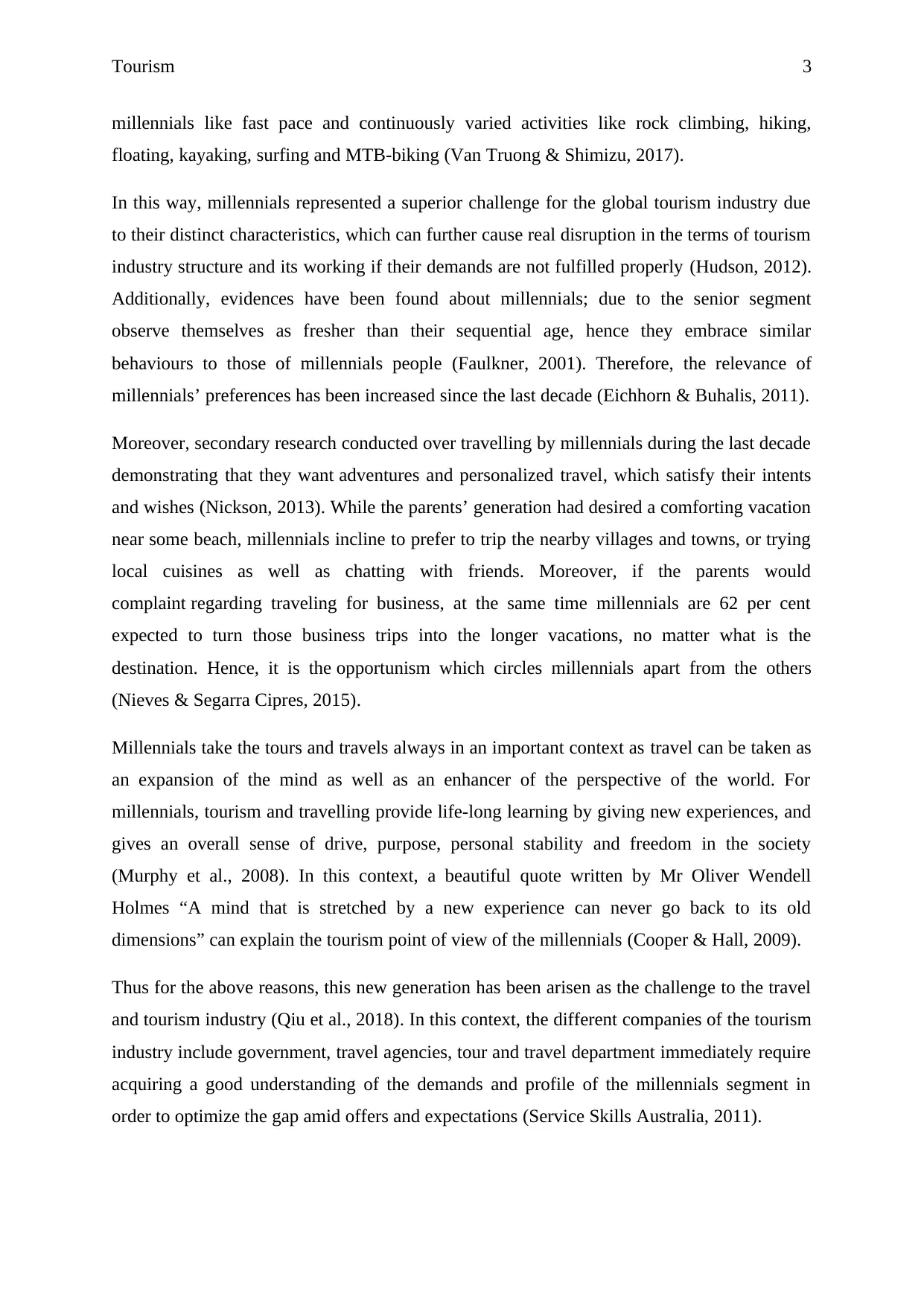
Tourism 3
millennials like fast pace and continuously varied activities like rock climbing, hiking,
floating, kayaking, surfing and MTB-biking (Van Truong & Shimizu, 2017).
In this way, millennials represented a superior challenge for the global tourism industry due
to their distinct characteristics, which can further cause real disruption in the terms of tourism
industry structure and its working if their demands are not fulfilled properly (Hudson, 2012).
Additionally, evidences have been found about millennials; due to the senior segment
observe themselves as fresher than their sequential age, hence they embrace similar
behaviours to those of millennials people (Faulkner, 2001). Therefore, the relevance of
millennials’ preferences has been increased since the last decade (Eichhorn & Buhalis, 2011).
Moreover, secondary research conducted over travelling by millennials during the last decade
demonstrating that they want adventures and personalized travel, which satisfy their intents
and wishes (Nickson, 2013). While the parents’ generation had desired a comforting vacation
near some beach, millennials incline to prefer to trip the nearby villages and towns, or trying
local cuisines as well as chatting with friends. Moreover, if the parents would
complaint regarding traveling for business, at the same time millennials are 62 per cent
expected to turn those business trips into the longer vacations, no matter what is the
destination. Hence, it is the opportunism which circles millennials apart from the others
(Nieves & Segarra Cipres, 2015).
Millennials take the tours and travels always in an important context as travel can be taken as
an expansion of the mind as well as an enhancer of the perspective of the world. For
millennials, tourism and travelling provide life-long learning by giving new experiences, and
gives an overall sense of drive, purpose, personal stability and freedom in the society
(Murphy et al., 2008). In this context, a beautiful quote written by Mr Oliver Wendell
Holmes “A mind that is stretched by a new experience can never go back to its old
dimensions” can explain the tourism point of view of the millennials (Cooper & Hall, 2009).
Thus for the above reasons, this new generation has been arisen as the challenge to the travel
and tourism industry (Qiu et al., 2018). In this context, the different companies of the tourism
industry include government, travel agencies, tour and travel department immediately require
acquiring a good understanding of the demands and profile of the millennials segment in
order to optimize the gap amid offers and expectations (Service Skills Australia, 2011).
millennials like fast pace and continuously varied activities like rock climbing, hiking,
floating, kayaking, surfing and MTB-biking (Van Truong & Shimizu, 2017).
In this way, millennials represented a superior challenge for the global tourism industry due
to their distinct characteristics, which can further cause real disruption in the terms of tourism
industry structure and its working if their demands are not fulfilled properly (Hudson, 2012).
Additionally, evidences have been found about millennials; due to the senior segment
observe themselves as fresher than their sequential age, hence they embrace similar
behaviours to those of millennials people (Faulkner, 2001). Therefore, the relevance of
millennials’ preferences has been increased since the last decade (Eichhorn & Buhalis, 2011).
Moreover, secondary research conducted over travelling by millennials during the last decade
demonstrating that they want adventures and personalized travel, which satisfy their intents
and wishes (Nickson, 2013). While the parents’ generation had desired a comforting vacation
near some beach, millennials incline to prefer to trip the nearby villages and towns, or trying
local cuisines as well as chatting with friends. Moreover, if the parents would
complaint regarding traveling for business, at the same time millennials are 62 per cent
expected to turn those business trips into the longer vacations, no matter what is the
destination. Hence, it is the opportunism which circles millennials apart from the others
(Nieves & Segarra Cipres, 2015).
Millennials take the tours and travels always in an important context as travel can be taken as
an expansion of the mind as well as an enhancer of the perspective of the world. For
millennials, tourism and travelling provide life-long learning by giving new experiences, and
gives an overall sense of drive, purpose, personal stability and freedom in the society
(Murphy et al., 2008). In this context, a beautiful quote written by Mr Oliver Wendell
Holmes “A mind that is stretched by a new experience can never go back to its old
dimensions” can explain the tourism point of view of the millennials (Cooper & Hall, 2009).
Thus for the above reasons, this new generation has been arisen as the challenge to the travel
and tourism industry (Qiu et al., 2018). In this context, the different companies of the tourism
industry include government, travel agencies, tour and travel department immediately require
acquiring a good understanding of the demands and profile of the millennials segment in
order to optimize the gap amid offers and expectations (Service Skills Australia, 2011).
Paraphrase This Document
Need a fresh take? Get an instant paraphrase of this document with our AI Paraphraser
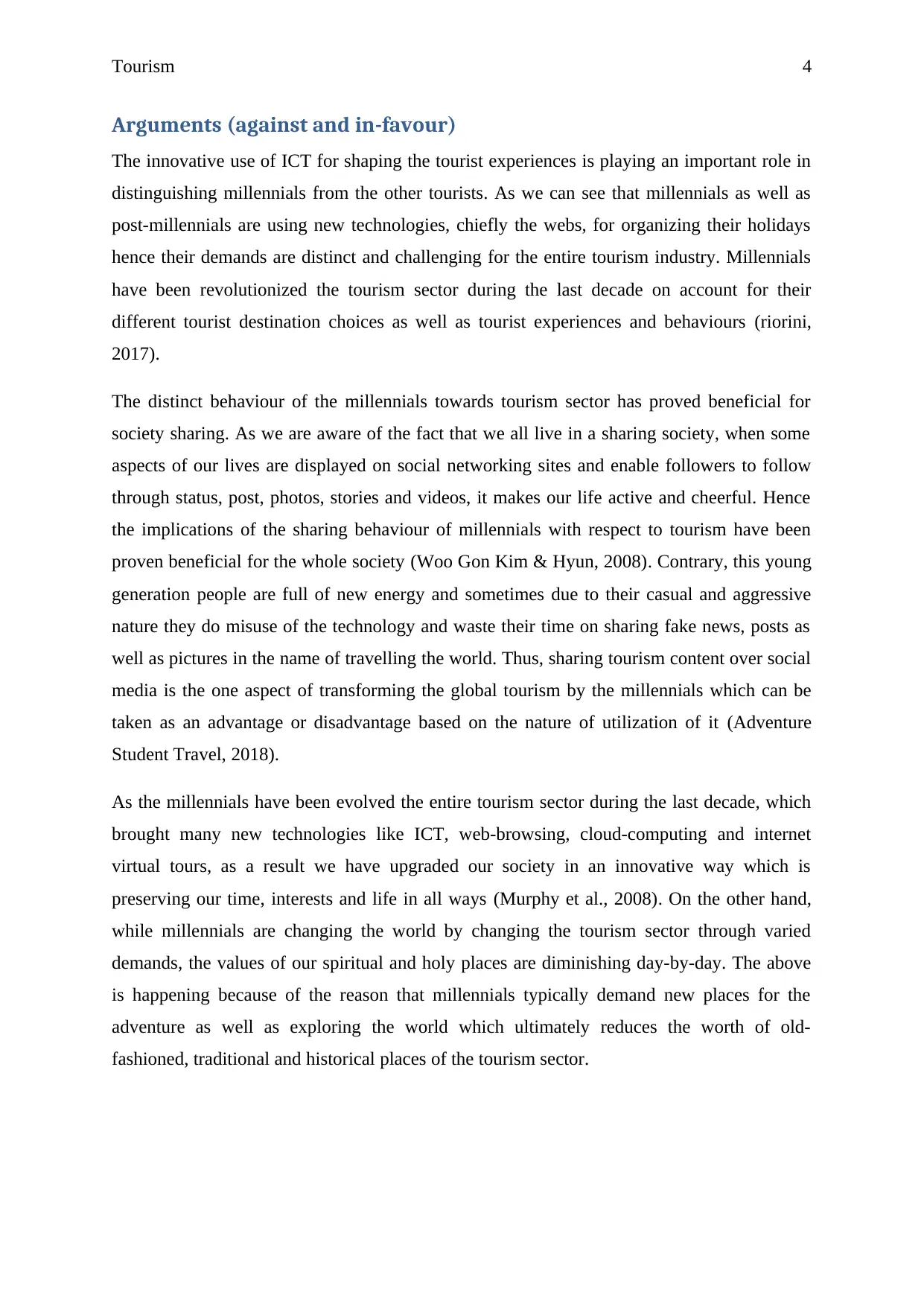
Tourism 4
Arguments (against and in-favour)
The innovative use of ICT for shaping the tourist experiences is playing an important role in
distinguishing millennials from the other tourists. As we can see that millennials as well as
post-millennials are using new technologies, chiefly the webs, for organizing their holidays
hence their demands are distinct and challenging for the entire tourism industry. Millennials
have been revolutionized the tourism sector during the last decade on account for their
different tourist destination choices as well as tourist experiences and behaviours (riorini,
2017).
The distinct behaviour of the millennials towards tourism sector has proved beneficial for
society sharing. As we are aware of the fact that we all live in a sharing society, when some
aspects of our lives are displayed on social networking sites and enable followers to follow
through status, post, photos, stories and videos, it makes our life active and cheerful. Hence
the implications of the sharing behaviour of millennials with respect to tourism have been
proven beneficial for the whole society (Woo Gon Kim & Hyun, 2008). Contrary, this young
generation people are full of new energy and sometimes due to their casual and aggressive
nature they do misuse of the technology and waste their time on sharing fake news, posts as
well as pictures in the name of travelling the world. Thus, sharing tourism content over social
media is the one aspect of transforming the global tourism by the millennials which can be
taken as an advantage or disadvantage based on the nature of utilization of it (Adventure
Student Travel, 2018).
As the millennials have been evolved the entire tourism sector during the last decade, which
brought many new technologies like ICT, web-browsing, cloud-computing and internet
virtual tours, as a result we have upgraded our society in an innovative way which is
preserving our time, interests and life in all ways (Murphy et al., 2008). On the other hand,
while millennials are changing the world by changing the tourism sector through varied
demands, the values of our spiritual and holy places are diminishing day-by-day. The above
is happening because of the reason that millennials typically demand new places for the
adventure as well as exploring the world which ultimately reduces the worth of old-
fashioned, traditional and historical places of the tourism sector.
Arguments (against and in-favour)
The innovative use of ICT for shaping the tourist experiences is playing an important role in
distinguishing millennials from the other tourists. As we can see that millennials as well as
post-millennials are using new technologies, chiefly the webs, for organizing their holidays
hence their demands are distinct and challenging for the entire tourism industry. Millennials
have been revolutionized the tourism sector during the last decade on account for their
different tourist destination choices as well as tourist experiences and behaviours (riorini,
2017).
The distinct behaviour of the millennials towards tourism sector has proved beneficial for
society sharing. As we are aware of the fact that we all live in a sharing society, when some
aspects of our lives are displayed on social networking sites and enable followers to follow
through status, post, photos, stories and videos, it makes our life active and cheerful. Hence
the implications of the sharing behaviour of millennials with respect to tourism have been
proven beneficial for the whole society (Woo Gon Kim & Hyun, 2008). Contrary, this young
generation people are full of new energy and sometimes due to their casual and aggressive
nature they do misuse of the technology and waste their time on sharing fake news, posts as
well as pictures in the name of travelling the world. Thus, sharing tourism content over social
media is the one aspect of transforming the global tourism by the millennials which can be
taken as an advantage or disadvantage based on the nature of utilization of it (Adventure
Student Travel, 2018).
As the millennials have been evolved the entire tourism sector during the last decade, which
brought many new technologies like ICT, web-browsing, cloud-computing and internet
virtual tours, as a result we have upgraded our society in an innovative way which is
preserving our time, interests and life in all ways (Murphy et al., 2008). On the other hand,
while millennials are changing the world by changing the tourism sector through varied
demands, the values of our spiritual and holy places are diminishing day-by-day. The above
is happening because of the reason that millennials typically demand new places for the
adventure as well as exploring the world which ultimately reduces the worth of old-
fashioned, traditional and historical places of the tourism sector.
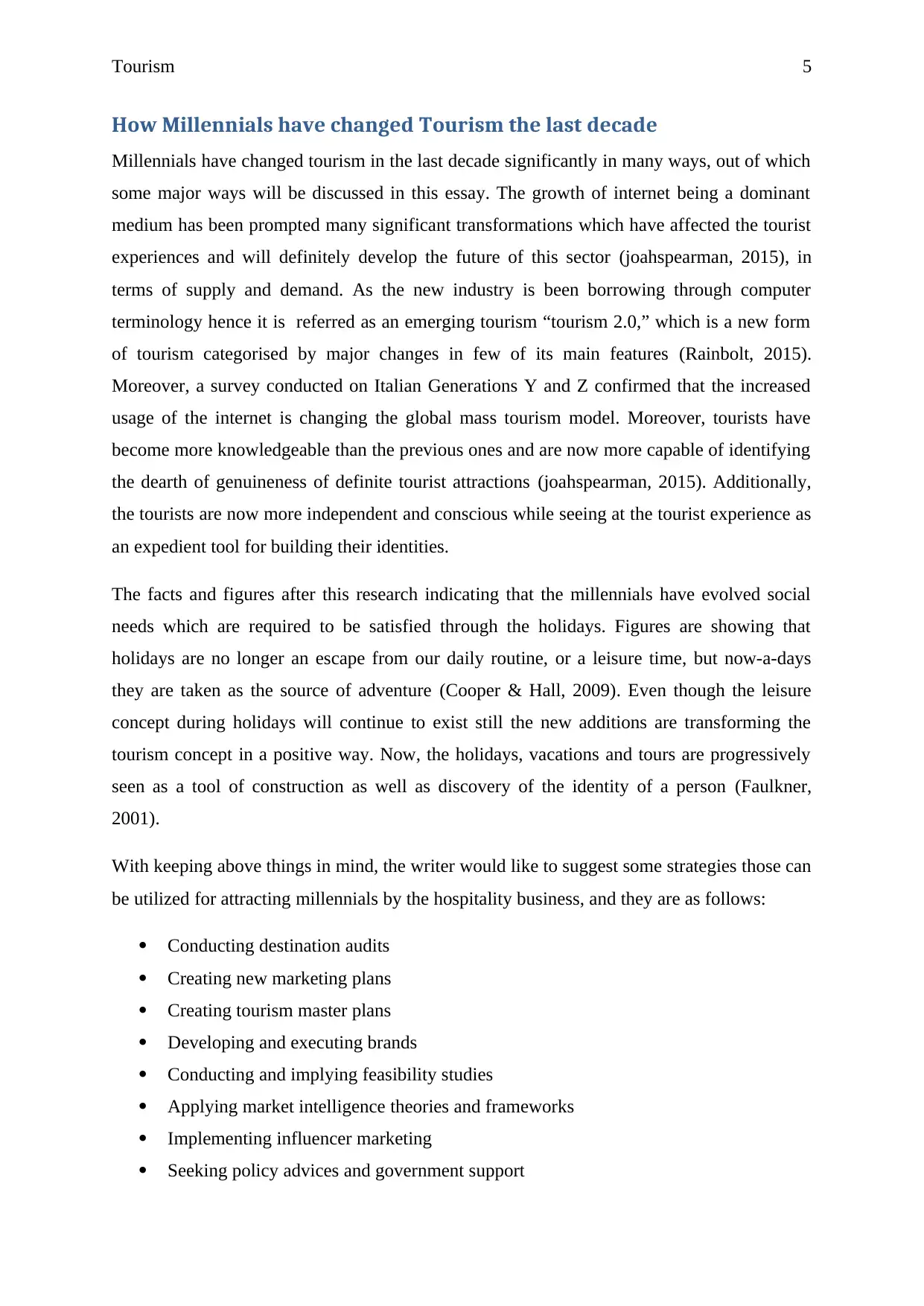
Tourism 5
How Millennials have changed Tourism the last decade
Millennials have changed tourism in the last decade significantly in many ways, out of which
some major ways will be discussed in this essay. The growth of internet being a dominant
medium has been prompted many significant transformations which have affected the tourist
experiences and will definitely develop the future of this sector (joahspearman, 2015), in
terms of supply and demand. As the new industry is been borrowing through computer
terminology hence it is referred as an emerging tourism “tourism 2.0,” which is a new form
of tourism categorised by major changes in few of its main features (Rainbolt, 2015).
Moreover, a survey conducted on Italian Generations Y and Z confirmed that the increased
usage of the internet is changing the global mass tourism model. Moreover, tourists have
become more knowledgeable than the previous ones and are now more capable of identifying
the dearth of genuineness of definite tourist attractions (joahspearman, 2015). Additionally,
the tourists are now more independent and conscious while seeing at the tourist experience as
an expedient tool for building their identities.
The facts and figures after this research indicating that the millennials have evolved social
needs which are required to be satisfied through the holidays. Figures are showing that
holidays are no longer an escape from our daily routine, or a leisure time, but now-a-days
they are taken as the source of adventure (Cooper & Hall, 2009). Even though the leisure
concept during holidays will continue to exist still the new additions are transforming the
tourism concept in a positive way. Now, the holidays, vacations and tours are progressively
seen as a tool of construction as well as discovery of the identity of a person (Faulkner,
2001).
With keeping above things in mind, the writer would like to suggest some strategies those can
be utilized for attracting millennials by the hospitality business, and they are as follows:
Conducting destination audits
Creating new marketing plans
Creating tourism master plans
Developing and executing brands
Conducting and implying feasibility studies
Applying market intelligence theories and frameworks
Implementing influencer marketing
Seeking policy advices and government support
How Millennials have changed Tourism the last decade
Millennials have changed tourism in the last decade significantly in many ways, out of which
some major ways will be discussed in this essay. The growth of internet being a dominant
medium has been prompted many significant transformations which have affected the tourist
experiences and will definitely develop the future of this sector (joahspearman, 2015), in
terms of supply and demand. As the new industry is been borrowing through computer
terminology hence it is referred as an emerging tourism “tourism 2.0,” which is a new form
of tourism categorised by major changes in few of its main features (Rainbolt, 2015).
Moreover, a survey conducted on Italian Generations Y and Z confirmed that the increased
usage of the internet is changing the global mass tourism model. Moreover, tourists have
become more knowledgeable than the previous ones and are now more capable of identifying
the dearth of genuineness of definite tourist attractions (joahspearman, 2015). Additionally,
the tourists are now more independent and conscious while seeing at the tourist experience as
an expedient tool for building their identities.
The facts and figures after this research indicating that the millennials have evolved social
needs which are required to be satisfied through the holidays. Figures are showing that
holidays are no longer an escape from our daily routine, or a leisure time, but now-a-days
they are taken as the source of adventure (Cooper & Hall, 2009). Even though the leisure
concept during holidays will continue to exist still the new additions are transforming the
tourism concept in a positive way. Now, the holidays, vacations and tours are progressively
seen as a tool of construction as well as discovery of the identity of a person (Faulkner,
2001).
With keeping above things in mind, the writer would like to suggest some strategies those can
be utilized for attracting millennials by the hospitality business, and they are as follows:
Conducting destination audits
Creating new marketing plans
Creating tourism master plans
Developing and executing brands
Conducting and implying feasibility studies
Applying market intelligence theories and frameworks
Implementing influencer marketing
Seeking policy advices and government support
⊘ This is a preview!⊘
Do you want full access?
Subscribe today to unlock all pages.

Trusted by 1+ million students worldwide
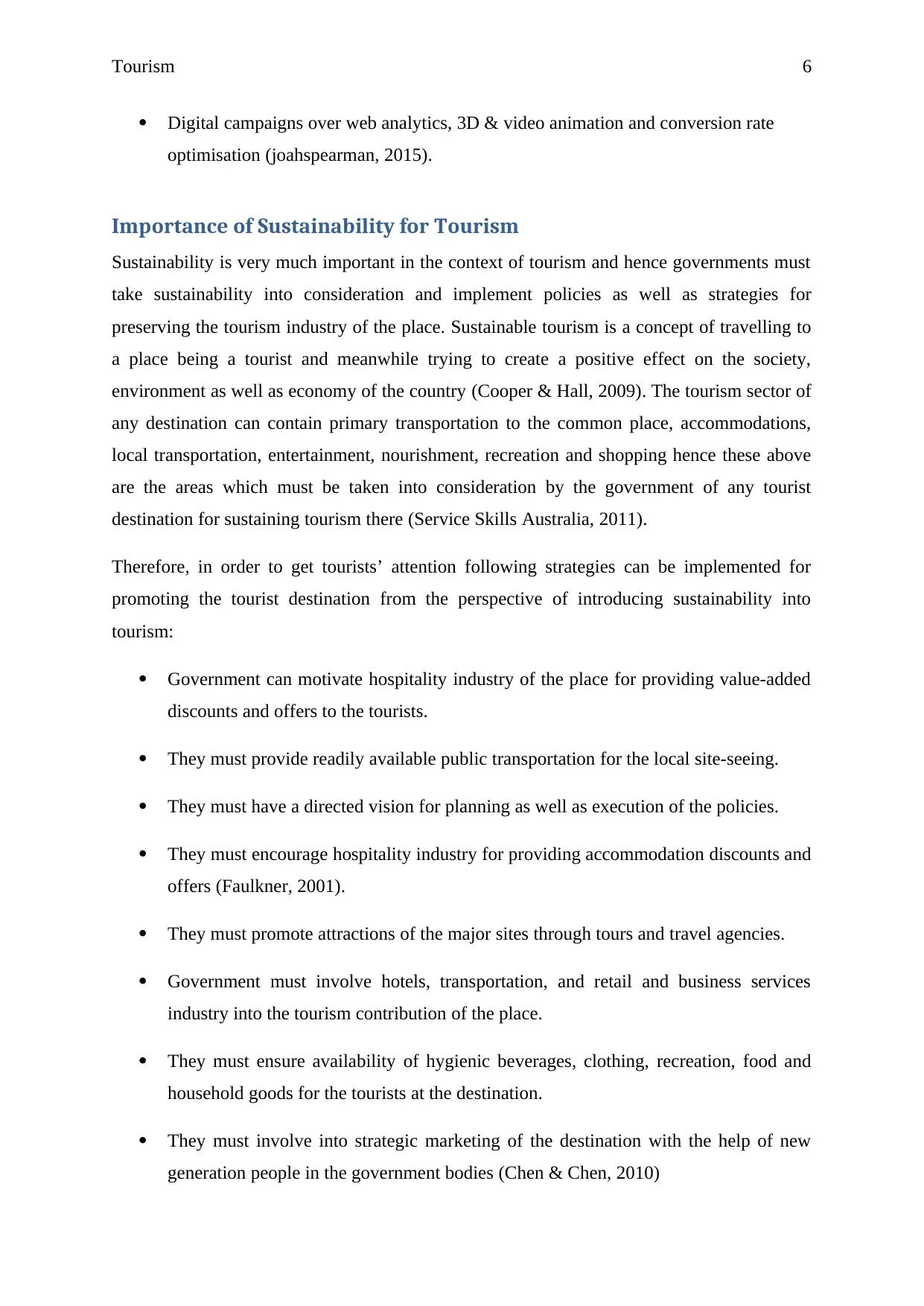
Tourism 6
Digital campaigns over web analytics, 3D & video animation and conversion rate
optimisation (joahspearman, 2015).
Importance of Sustainability for Tourism
Sustainability is very much important in the context of tourism and hence governments must
take sustainability into consideration and implement policies as well as strategies for
preserving the tourism industry of the place. Sustainable tourism is a concept of travelling to
a place being a tourist and meanwhile trying to create a positive effect on the society,
environment as well as economy of the country (Cooper & Hall, 2009). The tourism sector of
any destination can contain primary transportation to the common place, accommodations,
local transportation, entertainment, nourishment, recreation and shopping hence these above
are the areas which must be taken into consideration by the government of any tourist
destination for sustaining tourism there (Service Skills Australia, 2011).
Therefore, in order to get tourists’ attention following strategies can be implemented for
promoting the tourist destination from the perspective of introducing sustainability into
tourism:
Government can motivate hospitality industry of the place for providing value-added
discounts and offers to the tourists.
They must provide readily available public transportation for the local site-seeing.
They must have a directed vision for planning as well as execution of the policies.
They must encourage hospitality industry for providing accommodation discounts and
offers (Faulkner, 2001).
They must promote attractions of the major sites through tours and travel agencies.
Government must involve hotels, transportation, and retail and business services
industry into the tourism contribution of the place.
They must ensure availability of hygienic beverages, clothing, recreation, food and
household goods for the tourists at the destination.
They must involve into strategic marketing of the destination with the help of new
generation people in the government bodies (Chen & Chen, 2010)
Digital campaigns over web analytics, 3D & video animation and conversion rate
optimisation (joahspearman, 2015).
Importance of Sustainability for Tourism
Sustainability is very much important in the context of tourism and hence governments must
take sustainability into consideration and implement policies as well as strategies for
preserving the tourism industry of the place. Sustainable tourism is a concept of travelling to
a place being a tourist and meanwhile trying to create a positive effect on the society,
environment as well as economy of the country (Cooper & Hall, 2009). The tourism sector of
any destination can contain primary transportation to the common place, accommodations,
local transportation, entertainment, nourishment, recreation and shopping hence these above
are the areas which must be taken into consideration by the government of any tourist
destination for sustaining tourism there (Service Skills Australia, 2011).
Therefore, in order to get tourists’ attention following strategies can be implemented for
promoting the tourist destination from the perspective of introducing sustainability into
tourism:
Government can motivate hospitality industry of the place for providing value-added
discounts and offers to the tourists.
They must provide readily available public transportation for the local site-seeing.
They must have a directed vision for planning as well as execution of the policies.
They must encourage hospitality industry for providing accommodation discounts and
offers (Faulkner, 2001).
They must promote attractions of the major sites through tours and travel agencies.
Government must involve hotels, transportation, and retail and business services
industry into the tourism contribution of the place.
They must ensure availability of hygienic beverages, clothing, recreation, food and
household goods for the tourists at the destination.
They must involve into strategic marketing of the destination with the help of new
generation people in the government bodies (Chen & Chen, 2010)
Paraphrase This Document
Need a fresh take? Get an instant paraphrase of this document with our AI Paraphraser
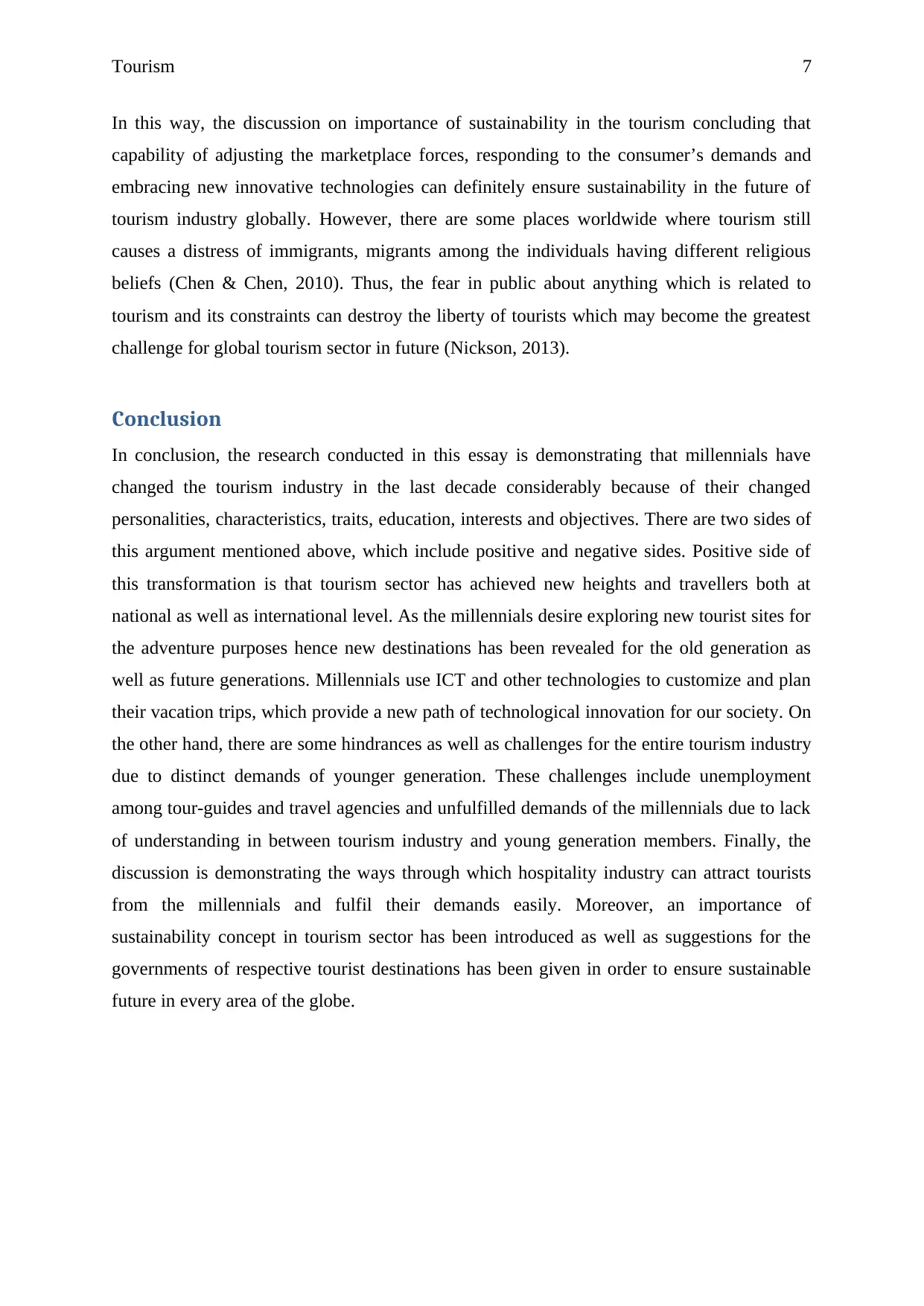
Tourism 7
In this way, the discussion on importance of sustainability in the tourism concluding that
capability of adjusting the marketplace forces, responding to the consumer’s demands and
embracing new innovative technologies can definitely ensure sustainability in the future of
tourism industry globally. However, there are some places worldwide where tourism still
causes a distress of immigrants, migrants among the individuals having different religious
beliefs (Chen & Chen, 2010). Thus, the fear in public about anything which is related to
tourism and its constraints can destroy the liberty of tourists which may become the greatest
challenge for global tourism sector in future (Nickson, 2013).
Conclusion
In conclusion, the research conducted in this essay is demonstrating that millennials have
changed the tourism industry in the last decade considerably because of their changed
personalities, characteristics, traits, education, interests and objectives. There are two sides of
this argument mentioned above, which include positive and negative sides. Positive side of
this transformation is that tourism sector has achieved new heights and travellers both at
national as well as international level. As the millennials desire exploring new tourist sites for
the adventure purposes hence new destinations has been revealed for the old generation as
well as future generations. Millennials use ICT and other technologies to customize and plan
their vacation trips, which provide a new path of technological innovation for our society. On
the other hand, there are some hindrances as well as challenges for the entire tourism industry
due to distinct demands of younger generation. These challenges include unemployment
among tour-guides and travel agencies and unfulfilled demands of the millennials due to lack
of understanding in between tourism industry and young generation members. Finally, the
discussion is demonstrating the ways through which hospitality industry can attract tourists
from the millennials and fulfil their demands easily. Moreover, an importance of
sustainability concept in tourism sector has been introduced as well as suggestions for the
governments of respective tourist destinations has been given in order to ensure sustainable
future in every area of the globe.
In this way, the discussion on importance of sustainability in the tourism concluding that
capability of adjusting the marketplace forces, responding to the consumer’s demands and
embracing new innovative technologies can definitely ensure sustainability in the future of
tourism industry globally. However, there are some places worldwide where tourism still
causes a distress of immigrants, migrants among the individuals having different religious
beliefs (Chen & Chen, 2010). Thus, the fear in public about anything which is related to
tourism and its constraints can destroy the liberty of tourists which may become the greatest
challenge for global tourism sector in future (Nickson, 2013).
Conclusion
In conclusion, the research conducted in this essay is demonstrating that millennials have
changed the tourism industry in the last decade considerably because of their changed
personalities, characteristics, traits, education, interests and objectives. There are two sides of
this argument mentioned above, which include positive and negative sides. Positive side of
this transformation is that tourism sector has achieved new heights and travellers both at
national as well as international level. As the millennials desire exploring new tourist sites for
the adventure purposes hence new destinations has been revealed for the old generation as
well as future generations. Millennials use ICT and other technologies to customize and plan
their vacation trips, which provide a new path of technological innovation for our society. On
the other hand, there are some hindrances as well as challenges for the entire tourism industry
due to distinct demands of younger generation. These challenges include unemployment
among tour-guides and travel agencies and unfulfilled demands of the millennials due to lack
of understanding in between tourism industry and young generation members. Finally, the
discussion is demonstrating the ways through which hospitality industry can attract tourists
from the millennials and fulfil their demands easily. Moreover, an importance of
sustainability concept in tourism sector has been introduced as well as suggestions for the
governments of respective tourist destinations has been given in order to ensure sustainable
future in every area of the globe.
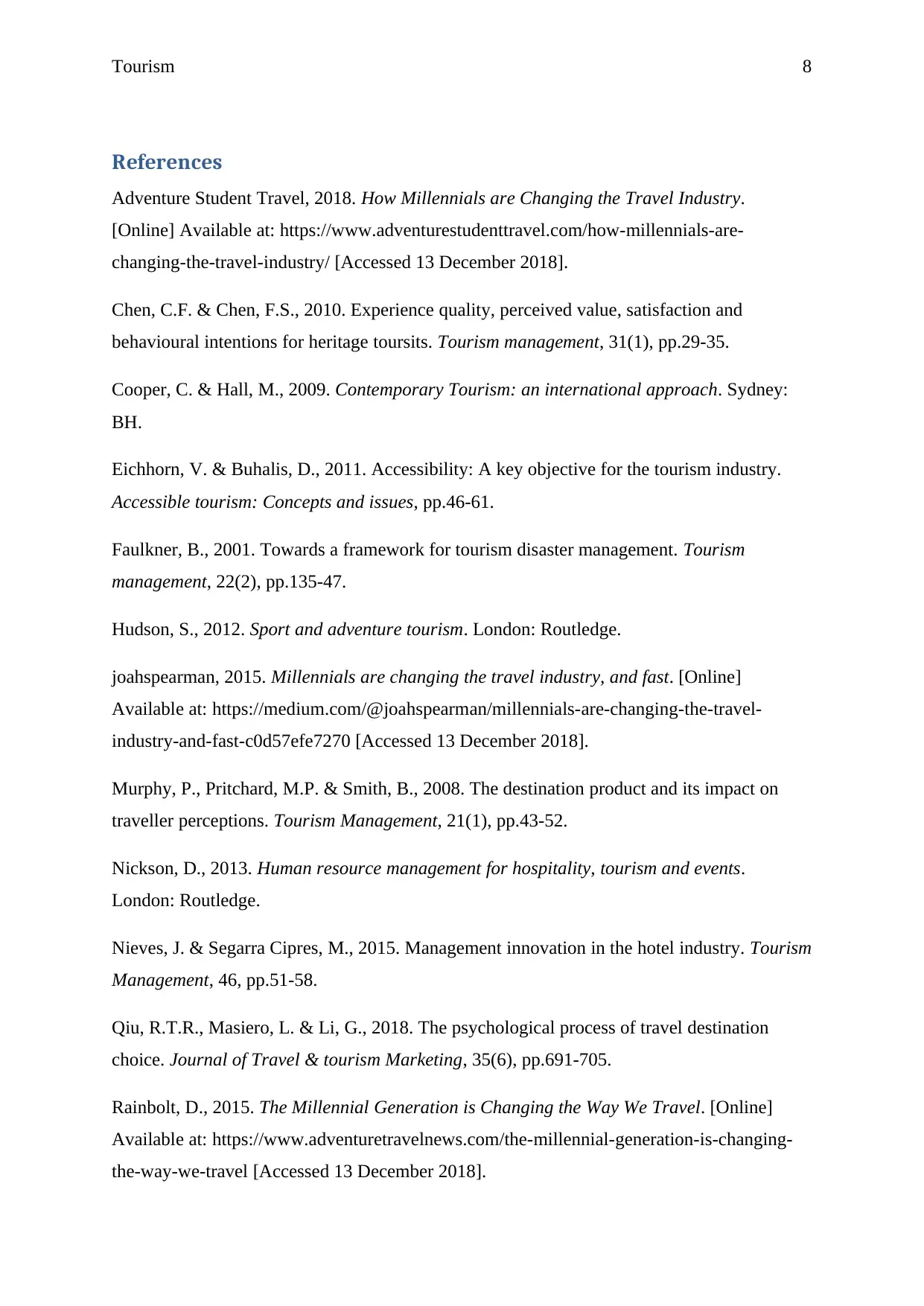
Tourism 8
References
Adventure Student Travel, 2018. How Millennials are Changing the Travel Industry.
[Online] Available at: https://www.adventurestudenttravel.com/how-millennials-are-
changing-the-travel-industry/ [Accessed 13 December 2018].
Chen, C.F. & Chen, F.S., 2010. Experience quality, perceived value, satisfaction and
behavioural intentions for heritage toursits. Tourism management, 31(1), pp.29-35.
Cooper, C. & Hall, M., 2009. Contemporary Tourism: an international approach. Sydney:
BH.
Eichhorn, V. & Buhalis, D., 2011. Accessibility: A key objective for the tourism industry.
Accessible tourism: Concepts and issues, pp.46-61.
Faulkner, B., 2001. Towards a framework for tourism disaster management. Tourism
management, 22(2), pp.135-47.
Hudson, S., 2012. Sport and adventure tourism. London: Routledge.
joahspearman, 2015. Millennials are changing the travel industry, and fast. [Online]
Available at: https://medium.com/@joahspearman/millennials-are-changing-the-travel-
industry-and-fast-c0d57efe7270 [Accessed 13 December 2018].
Murphy, P., Pritchard, M.P. & Smith, B., 2008. The destination product and its impact on
traveller perceptions. Tourism Management, 21(1), pp.43-52.
Nickson, D., 2013. Human resource management for hospitality, tourism and events.
London: Routledge.
Nieves, J. & Segarra Cipres, M., 2015. Management innovation in the hotel industry. Tourism
Management, 46, pp.51-58.
Qiu, R.T.R., Masiero, L. & Li, G., 2018. The psychological process of travel destination
choice. Journal of Travel & tourism Marketing, 35(6), pp.691-705.
Rainbolt, D., 2015. The Millennial Generation is Changing the Way We Travel. [Online]
Available at: https://www.adventuretravelnews.com/the-millennial-generation-is-changing-
the-way-we-travel [Accessed 13 December 2018].
References
Adventure Student Travel, 2018. How Millennials are Changing the Travel Industry.
[Online] Available at: https://www.adventurestudenttravel.com/how-millennials-are-
changing-the-travel-industry/ [Accessed 13 December 2018].
Chen, C.F. & Chen, F.S., 2010. Experience quality, perceived value, satisfaction and
behavioural intentions for heritage toursits. Tourism management, 31(1), pp.29-35.
Cooper, C. & Hall, M., 2009. Contemporary Tourism: an international approach. Sydney:
BH.
Eichhorn, V. & Buhalis, D., 2011. Accessibility: A key objective for the tourism industry.
Accessible tourism: Concepts and issues, pp.46-61.
Faulkner, B., 2001. Towards a framework for tourism disaster management. Tourism
management, 22(2), pp.135-47.
Hudson, S., 2012. Sport and adventure tourism. London: Routledge.
joahspearman, 2015. Millennials are changing the travel industry, and fast. [Online]
Available at: https://medium.com/@joahspearman/millennials-are-changing-the-travel-
industry-and-fast-c0d57efe7270 [Accessed 13 December 2018].
Murphy, P., Pritchard, M.P. & Smith, B., 2008. The destination product and its impact on
traveller perceptions. Tourism Management, 21(1), pp.43-52.
Nickson, D., 2013. Human resource management for hospitality, tourism and events.
London: Routledge.
Nieves, J. & Segarra Cipres, M., 2015. Management innovation in the hotel industry. Tourism
Management, 46, pp.51-58.
Qiu, R.T.R., Masiero, L. & Li, G., 2018. The psychological process of travel destination
choice. Journal of Travel & tourism Marketing, 35(6), pp.691-705.
Rainbolt, D., 2015. The Millennial Generation is Changing the Way We Travel. [Online]
Available at: https://www.adventuretravelnews.com/the-millennial-generation-is-changing-
the-way-we-travel [Accessed 13 December 2018].
⊘ This is a preview!⊘
Do you want full access?
Subscribe today to unlock all pages.

Trusted by 1+ million students worldwide
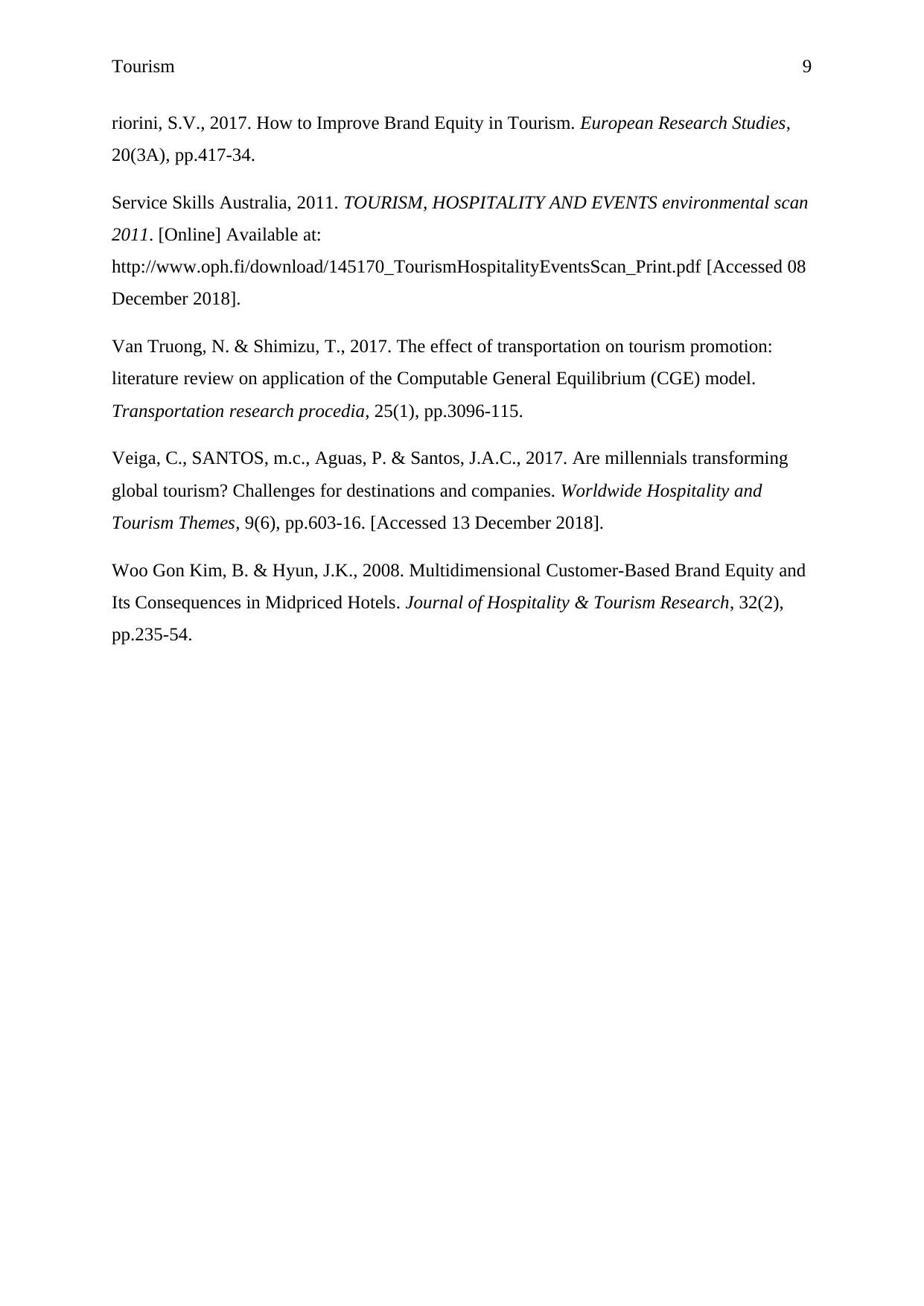
Tourism 9
riorini, S.V., 2017. How to Improve Brand Equity in Tourism. European Research Studies,
20(3A), pp.417-34.
Service Skills Australia, 2011. TOURISM, HOSPITALITY AND EVENTS environmental scan
2011. [Online] Available at:
http://www.oph.fi/download/145170_TourismHospitalityEventsScan_Print.pdf [Accessed 08
December 2018].
Van Truong, N. & Shimizu, T., 2017. The effect of transportation on tourism promotion:
literature review on application of the Computable General Equilibrium (CGE) model.
Transportation research procedia, 25(1), pp.3096-115.
Veiga, C., SANTOS, m.c., Aguas, P. & Santos, J.A.C., 2017. Are millennials transforming
global tourism? Challenges for destinations and companies. Worldwide Hospitality and
Tourism Themes, 9(6), pp.603-16. [Accessed 13 December 2018].
Woo Gon Kim, B. & Hyun, J.K., 2008. Multidimensional Customer-Based Brand Equity and
Its Consequences in Midpriced Hotels. Journal of Hospitality & Tourism Research, 32(2),
pp.235-54.
riorini, S.V., 2017. How to Improve Brand Equity in Tourism. European Research Studies,
20(3A), pp.417-34.
Service Skills Australia, 2011. TOURISM, HOSPITALITY AND EVENTS environmental scan
2011. [Online] Available at:
http://www.oph.fi/download/145170_TourismHospitalityEventsScan_Print.pdf [Accessed 08
December 2018].
Van Truong, N. & Shimizu, T., 2017. The effect of transportation on tourism promotion:
literature review on application of the Computable General Equilibrium (CGE) model.
Transportation research procedia, 25(1), pp.3096-115.
Veiga, C., SANTOS, m.c., Aguas, P. & Santos, J.A.C., 2017. Are millennials transforming
global tourism? Challenges for destinations and companies. Worldwide Hospitality and
Tourism Themes, 9(6), pp.603-16. [Accessed 13 December 2018].
Woo Gon Kim, B. & Hyun, J.K., 2008. Multidimensional Customer-Based Brand Equity and
Its Consequences in Midpriced Hotels. Journal of Hospitality & Tourism Research, 32(2),
pp.235-54.
1 out of 10
Related Documents
Your All-in-One AI-Powered Toolkit for Academic Success.
+13062052269
info@desklib.com
Available 24*7 on WhatsApp / Email
![[object Object]](/_next/static/media/star-bottom.7253800d.svg)
Unlock your academic potential
Copyright © 2020–2026 A2Z Services. All Rights Reserved. Developed and managed by ZUCOL.




